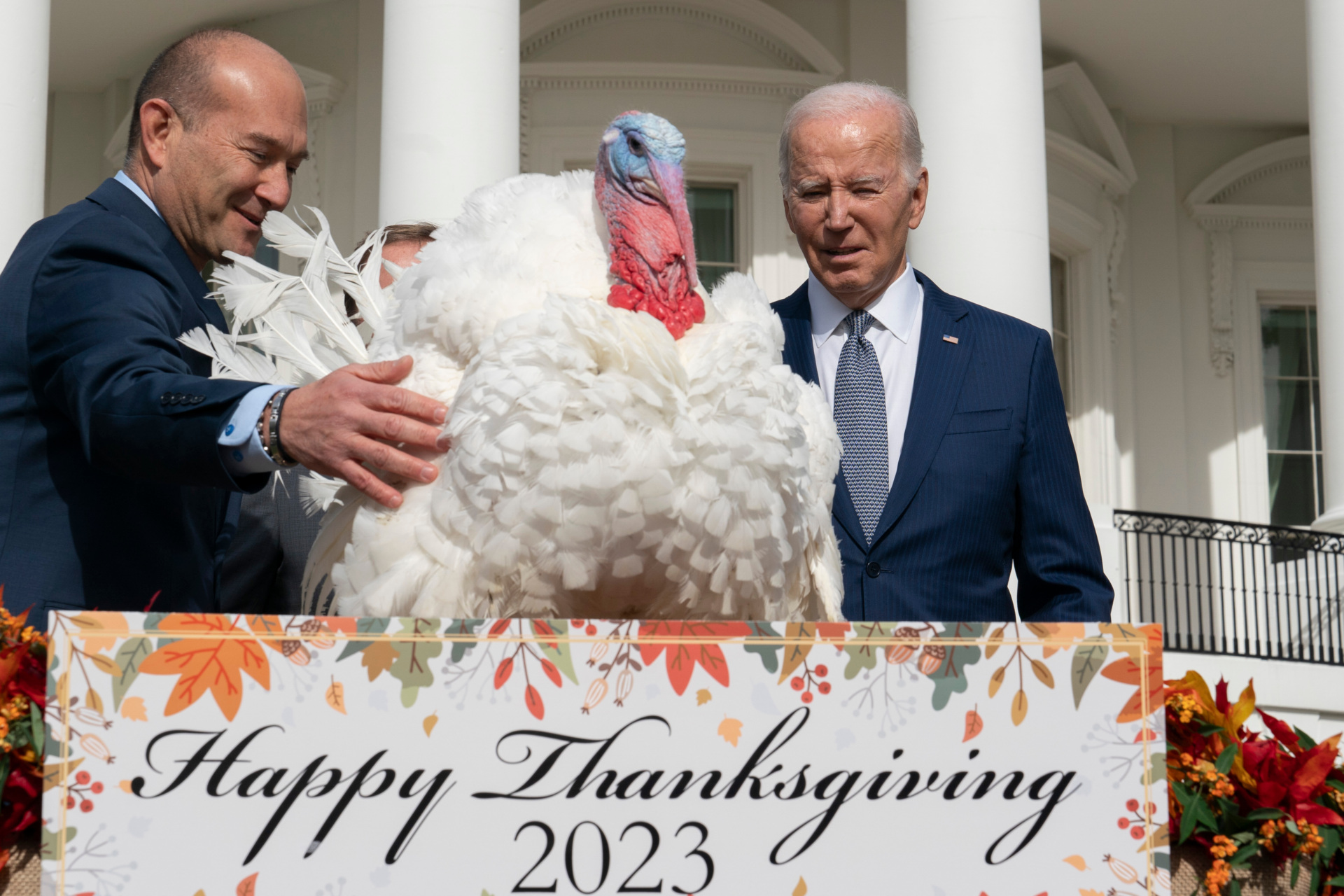Breitbart Business Digest: Americans Aren’t Giving Thanks for Biden’s Economy
Ornery Americans Refuse to Stop Noticing Inflation
Someone forgot to tell American families that inflation has been canceled.
The University of Michigan’s survey of consumer sentiment was released on Wednesday. The most striking development in consumer sentiment is not the fact that households remain in the doldrums about the economy—that’s been going on for a while now—but a dramatic increase in consumer expectations for inflation.
Back in September, consumers were expecting inflation over the next year to come in at 3.2 percent, which was a decline from the 3.5 percent expected in August. This gave rise to the hope that expectations—which Fed officials are convinced play a crucial role in setting the actual inflation rate—would fall back toward the 2.3 percent to three percent range seen in the two years prior the the pandemic, a golden age of rapid growth and low inflation that the establishment media tries never to link to the policies of the man who was then President of the United States.
In October, however, the year-ahead inflation expectations climbed back up to 3.8 percent, which was the highest since May of 2022. The preliminary mid-month reading for November should have set off alarm bells when it climbed to 4.4 percent. The final reading published on Wednesday has the year-ahead inflation reading at 4.5 percent, the highest since 2011.
Americans also think inflation will be higher over the longer term. Long-run inflation expectations edged up from 2.8 percent last month in September to 3.0 percent in October. This was undesirable, but it was at least within the narrow range of 2.9 percent to 3.1 percent long-run expectations had bounced between in 25 of the last 27 months. The November result showed a break above this range, to 3.2 percent, the highest since 2011.
While some in the establishment media and on Wall Street have been dismissive of these rising inflation expectations, these expectations seem perfectly rational when viewed in light of the significant easing of financial conditions that has occurred in the last month. At the start of the month, the 10-year Treasury yield was near five percent. Over the last three weeks, it has crashed to 4.429 percent. Mortgage rates are falling. The dollar has weakened. The stock market has been on an incredible bull run, with the S&P 500 up eight percent.

President Joe Biden is seen at the pardoning ceremony for the Thanksgiving turkey with Jose Rojas (left) at the White House on Nov. 20, 2023. (Chris Kleponis/CNP/Bloomberg via Getty Images)
All other things being equal, easier financial conditions are likely to undermine the Fed’s attempt to bring inflation down—which is what the public apparently expects to happen.
The minutes from the Fed meeting that were released Tuesday told us that “[p]articipants judged that the current stance of monetary policy was restrictive and was putting downward pressure on economic activity and inflation. In addition, they noted that financial conditions had tightened significantly in recent months.”
That’s less true now than it was three weeks ago.
A Dark Anniversary
The twenty-second day of November marks the sixtieth anniversary of the assassination of President John F. Kennedy.

President John F Kennedy in the presidential limousine before his assassination on Nov. 22, 1963, in Dallas, Texas. His wife Jacqueline is next to him and Texas Governor John Connally and his wife Nellie sit in front. (Universal History Archive/Universal Images Group via Getty Images)
The following day the New York Times ran a story explaining the assassination’s meaning for the United States. The article ran on the center of the front page, just below a picture of the murdered president. Its title: “Why America Weeps: Kennedy Victim of Violent Streak He Sought to Curb in the Nation.”
Here’s how the story opens:
America wept tonight, not alone for its dead young President, but for itself. The grief was geneal, for somehow the worst in the nation had prevailed over the best. The indictment extended beyond the assassin, for something in the nation itself, some strain of madness or violence, had destroyed the highest symbol of law and order.
Speaker John McCormack, now 71 and, by the peculiarities of politics, next in line of succession after the Vice President, expressed this sense of national dismay and self-criticism:
“My God! My God! What are we coming to?”
The irony of the President’s death is that his short administration was devoted almost entirely to various attempts to curb this very streak of violence in the American character.
When the historians get around to assessing his three years in office, it is very likely that they will be impressed with just this: his efforts to restrain those who wanted to be more violent in the cold war overseas and those who wanted to be more violent in the racial war at home.
He was in Texas today trying to pacify the violent politics of that state. He was in Florida last week trying to pacify the businessmen and appealing to them to believe that he was not “anti-business.” And from the beginning to the end of his Administration, he was trying to damp down the violence of the extremists on the Right.
Kennedy was assassinated by a communist named Lee Harvey Oswald. No strain of madness or violence in the “nation itself” was involved apart from Oswald’s dedication to global communism. Yet the New York Times immediately linked Kennedy’s assassination to “extremists on the Right.”

Headlines announcing President Kennedy’s assassination from the New York Daily News, the New York Times, and the New York Herald Tribune on November 23, 1963. (Getty Images)
“The thing that hath been, it is that which shall be; and that which is done is that which shall be done: and there is no new thing under the sun,” we’re told by the Book of Ecclesiastes, and it now seems more true than ever.
Thanksgiving: A History and Another Word from Ecclesiastes
This year is the 210th anniversary of the sermon by Hannah Mather Crocker that arguably launched our tradition of Thanksgiving.
As we reported four years ago:
Crocker’s 1813 sermon is entitled “Thanksgiving sermon.” The title harkens back to the proclamations of Washington and Adams and the customs of her New England forebears. She did not, it seems, feel the need for the government to give her permission to declare a day in late November to be Thanksgiving.
The theme of Crocker’s sermon is the revival of American greatness. It takes as its starting point Philippians 4:6: “Be careful for nothing; but in everything by prayer and supplication with thanksgiving let your request be made known to God.” In other words, be bold when you speak to God, when you reach out to God for your needs, because you are special to him. You are deserving of his love. Do not meekly accept what the world offers but courageously appeal to God…
“Be careful for nothing, but by prayers and supplications with thanksgiving make known your request unto God,” Crocker concluded. ”And the praise and glory shall be given to him who is the same yesterday, today, and forever.”
It was the sermon of a woman who was both a rebel against the powers of the world and a servant of God. And those two things combined to make her something else: a true American patriot.
Enjoy your Thanksgiving. Give thanks, eat well, and be careful for nothing. That is, let Thanksgiving be a day when prayer, gratitude, and hope push out the anxieties and fears the world thrusts upon us.
The unknown author of the Book of Ecclesiastes has some relevant words for us. Although the dour and cynical preacher is not known for his high spirits, he does offer us this: “Here is what I have seen: It is good and fitting for one to eat and drink, and to enjoy the good of all his labor in which he toils under the sun all the days of his life which God gives him; for it is his heritage. As for every man to whom God has given riches and wealth, and given him power to eat of it, to receive his heritage and rejoice in his labor—this is the gift of God.”
Have a blessed Thanksgiving!





Comments are closed.